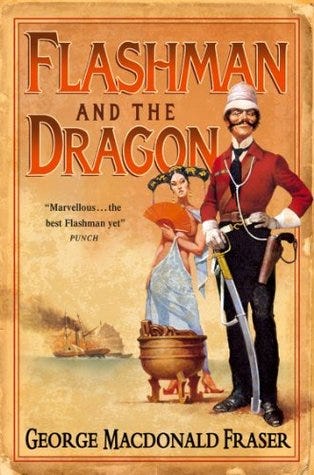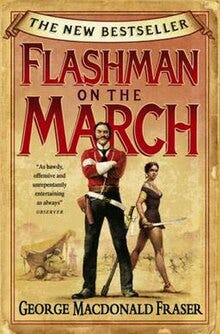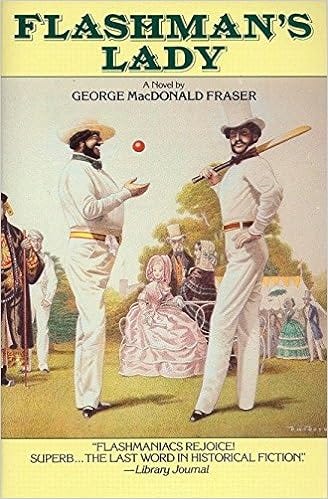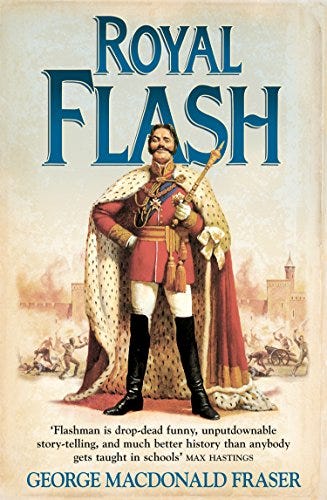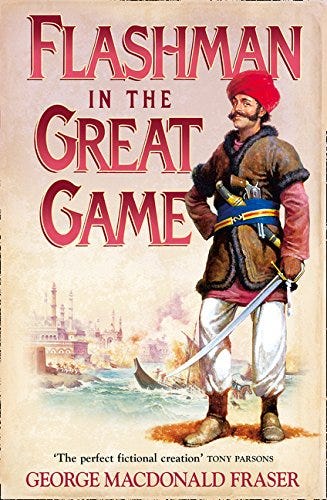Between the late '60s and early '00s, British historian, newspaper man, and WWII veteran George Macdonald Fraser wrote and published a series of eleven novels and one short story anthology following the military exploits of Sir Harry Paget Flashman, the infamous bully from 1857 English classic novel Tom Brown's School Days.
It turned out that, after being expelled from Rugby School in the late 1830s, Flashman had joined the 11th Hussars and gone on to become one of England's most decorated war heroes. The Flashman Papers are his purported memoirs. Through Flashman's eyes Fraser explores all of Victorian military history, from the Kabul Retreat to the Boer War. Flashman was there for it all.
I've been slowly making my way through all twelve of the Flashman books for the last two and a half years. Now that I'm finally done, I can report that Fraser was perhaps the finest novelist of the 20th century. His books are works of both comedic genius and compelling historical drama. His foremost intention was to capture (in a readable modern style) the realities of British colonialism, not just in action, but in thought and speech. Harry Flashman himself is a lying, bullying, toadying, lecherous poltroon, who, by virtue of cowardice and good luck, emerges from each adventure looking like a hero--which only brings about more trouble in the end.
This conceit has been much-plagiarized since the release of Flashman in the 1960s. Readers of this blog might be most familiar with Sandy Mitchell's Ciaphas Cain series, which is an adaptation of Flashman into the 41st Millennium.
But however brilliant they may be conceptually, the Papers are sold in execution. What makes the series so brilliant is, in actuality, its historical basis, and its superb writing. These are the things I wish to discuss here.
Reach Out and Touch History
There's little doubt that Flashman is on the verge of cancellation, if he hasn't been pushed off that particular cliff already. Fraser pulls no punches in his depiction of the man and the time he resided in. Aside from the series' unflinching depictions of racism, Flashman is among the least politically correct character to have been written within the last half century.
And it is glorious.
Plenty of novels are set in the past, but few achieve what Fraser accomplished twelve-and-a-half times. Flashman, through his mannerisms, through his speech and his thoughts, is the past. It is as if a man from another century has been resurrected in your mind. And unlike any real memoirs from the Victorian era, you'll be able to actually get through his writing without falling asleep.
Harry Flashman, his wife Elspeth, his father-in-law John Morrison, and his archnemesis John Charity Spring are the only prominent characters throughout the series who are fictional. Nearly everyone else, from ally to antagonist, is a real, historical person, including the majority of the women Flashman beds (and sometimes weds). Every event is historical, too, with the exception of Royal Flash. Every battle, every engagement, every mission and every sword fight. When a vignette isn't rooted in definite historical fact, which is only rarely, it tends to instead be an adaptation of some otherwise real historical account--an attack on a stagecoach by Native Americans in the Old West, an encounter with sowars on the road in India.
Fraser expects the reader to come with a large degree of context pre-established. Flashman only gives a general gist of the politics before delving into his latest affair. This is why I recommend reading the series on Kindle if possible. Hyperlinks and easy access to Wikipedia makes reading the books a breeze. I'd never dare try in print.
But beyond the quality of the writing, what makes the Papers so phenomenal is Fraser's ability to animate the past. He gives a voice to the voiceless and long-dead and lets you empathize with a people who, today, seem quite alien to us. He is honest when he depicts the horrors of empire and colonialism, and he is honest when he depicts the horrors of its absence, too.
Anyone interested in colonialism and Victorian military history needs to read these books. They are, in many ways, as well-researched and accurate as any textbook you'll find on the subject. There are no historical errors anywhere. With the exception of Flashman himself, almost every scene of every book will be relating something real.
When it comes to historical fiction, no one has ever done it better than Flashy.
To Write With Fun
But history is not why I fell in love with these books. The most obvious appeal is Fraser's writing of itself. It is brilliant.
The Papers are satires of the Victorian era, and so might be regarded as comedies before anything else. This is vital, because if Flashman wasn't funny, reading these books would be like watching a snuff film. It wouldn't be fun. The events depicted, all of the worst atrocities and horrors of the 19th Century, would weigh too heavily on the reader. It would not be fun.
But Fraser never failed to find some way to make things fun. He always found some way to reinvent himself, never becoming mired in formula or conventions.
Here are some examples that come to mind:
Throughout the series, Flashman will occasionally begin rendering exchanges of dialogue in stage play format, just to mix things up.
In the sixth book, excerpts from Flashman's wife's diary are regularly interspersed throughout. Her prose Reflects the ways In Which a Lady of that Time Period most likely would have Written in Her Diary; that is to say, in embarrassingly florid style, with every other word capitalized for no apparent reason.
Flashman, as a soldier, has a rather foul mouth. Several of the novels have therefore been censored by his Puritanical Scottish in-laws to remove all of the explicit language--which, of course, has been left in for our pleasure.
The series is filled with footnotes, written from the perspective of Fraser himself as the "editor" of the collection (to keep up the charade that Flashman was, in fact, a real person).
But the books aren't simple comedies with a historical backdrop. They're also expertly written adventure novels. No one has ever written exciting action better than Fraser. He takes accounts of real military action and roots them in Flashy's perspective without ever losing sight of the human stakes and real-world consequences of violence. As a soldier himself, I have no doubt that Fraser understood what it felt like to fight for one's life better than most authors alive today ever could. He used these experiences to great effect in the Flashman Papers.
Most important of all, the Papers are relentlessly dramatically engaging. There will never come a chapter where you will not wonder what is going to happen next, and there will never be a character whose fate does not enrapture you. And when Fraser wants Flashman to be taken seriously, when he's describing the death march from the Siege of Cawnpore or the butchering of British civilians by Indian mutineers, no other author could shock, horrify, and reduce to tears so well.
The specters of the past resurrected in his books will haunt your memory for as long as you live.
Series Ranking and Review: A List
So I don't need to keep repeating myself, let it henceforth be known that there is not a single book in this series that I dislike. Even the first title on this list is worth reading. The difference between the best Flashy book and the worst is, quite honestly, rather slim. These rankings are based on a number of personal preferences for time, place, and subject matter, rather than any sort of objective qualifier. But if you're short on time, I would absolutely recommend the books at this list's bottom long before the ones at its top.
#12. Flashman and the Dragon (Book 8)
I was somewhat surprised when I learned that Flashman and the Dragon is often considered the worst book in the series by Fraser fanatics. It has everything you would expect: an affair with a Chinese empress, lies and deceit and betrayal, high adventure, and a fascinating setting.
Yet it left such a small impression on me. The Empress-Dowager is a retread of much more interesting Oriental femme fatales like Lakshmibai and the Silk One, and the soldiering scenes are simpler and less imaginative than many others. Ultimately, Flashman and the Dragon lacks the bite of the other books in the series; it has nothing exciting that makes it stand out as anything more than a decent historical comedy-adventure novel. For that reason I relegate it to the spot of the "worst" book in the Flashman Papers.
#11. Flashman and the Tiger (Book 11)
A collection of short-ish stories and a novella, Flashman and the Tiger sees Flashy meet Sherlock Holmes, ties up a loose thread from Royal Flash, and depicts a sword fight that lasts for about two hundred pages.
Overall, I like the shorter, more plot-focused narratives found within this book. The characters are not Fraser's best, but there are memorable moments throughout--and, to be honest, I think Flashman x Holmes is a lot of fun. He doesn't overdo it.
But like Flashman and the Dragon, Flashman and the Tiger lacks the emotional heights of the series' best novels, and it doesn't try to delve into historical tragedy as Fraser's other books do. Flashman is at his best when he's embroiled in global political schemes and lost within an epic sea of war and action, forced to do great things despite his rotten heart. Here, he mostly just runs away from bad guys and whines.
That can be funny. But it's not much more than that.
#10. Flashman on the March (Book 12)
The final Flashman book, Flashman on the March is fantastic as always, but was written when Fraser was in his 80s. It has one of the series' most interesting setting: the British expedition to Abyssinia, which is a little-known but surreal and fascinating piece of Victorian history, handled with the deftness anyone would expect.
But Fraser's age shows through the pages. The beginning meanders, and his outrage at Bush & Co. for the invasion of Iraq seems to bleed through Flashman's usual narration. The climax is strong, but it took me more than a year to completely read it through. I would place Flashman on the March among the best in the series for its subject matter, but among the worst in action, plot, and pacing.
#9. Flash for Freedom (Book 3)
Flash for Freedom sees Flashy shipped off for his first American adventure. The first half of the story takes place onboard an illegal slaving vessel in the Atlantic in the 1840s; the second follows Flashman on land throughout the Antebellum South.
In many ways, I'd say that this is one of Fraser's finest books. The beginning, with unforgettable antagonist John Charity Spring, is phenomenal, and would rank near the top of this list taken on its own. The action is unending and the stakes never let up.
But the second half becomes very unpleasant, as Flashy takes up work as a slavedriver on a plantation, has an affair with a horrendous Southern aristocrat, and betrays some of the series' most sympathetic characters. This is Harry Flashman at his absolute worst, and while he's still charming in his way, the heaviness of the subject matter makes him wear on the reader far more than he does elsewhere.
In the final book on this list, Flashman's view of himself is overly critical: he actually does behave heroically, despite having immoral motivations. But in Flash for Freedom, he's really just an awful, evil bastard.
Don't think that means I wouldn't recommend it. I absolutely would, for all the expected reasons. There is a reason why Flash for Freedom is often listed among the best books in the series. But I like it a lot less than some of the others, so I place it at #9.
#8. Flashman and the Redskins (Book 7)
Flashman and the Redskins is the longest novel in the series by far, effectively containing both the sequel to Flash for Freedom AND a self-contained sequel to that story within a single package. Many consider it Fraser's finest work, and it's not hard to understand why. This is a beautifully researched and presented adventure through the West, spanning decades and incorporating just about every character you could hope for.
But as an American (and a Western writer myself), I learned very little from Flashman and the Redskins. As amusing as it is to see a British Army colonel fight at Little Bighorn, I find none of the sense of mystery and awe in the unfamiliar as I do in the Indian novels especially. This is likely the reason why I don't like the American Flashman novels as much as those set in Europe and the East, generally, and why I won't rank this book any better than #8.
#7. Flashman's Lady (Book 6)
It took me a year to get through the first third of Flashman's Lady and about four hours to get through the rest. Its beginning is slow, bogged down in the intricacies of cricket, but its latter half is fabulous. This book has several of the series' best action sequences and many of its most interesting dramatized historical personas, if for no other reason than that I'd never heard of any of them before. His depictions of Queen Ranavalona and the atrocities of Madagascar under her rule are particularly unforgettable.
But the main reason why I place it here is because it's the only book in the series in which we receive excerpts from anyone else's perspective--in this case, Elspeth Flashman's . This is also the only book in which Elspeth actually gets to do anything in the plot, for fairly obvious reasons. This was a brilliant twist on the Flashman formula and the perfect way to get a new look at the eponymous character. That alone earns this book its place on this list.
#6. Flashman and the Mountain of Light (Book 9)
Flashman and the Mountain of Light is the most plot-driven Flashman story, and one of the two major Indian novels. While its flurry of characters can be hard to keep track of, it's a beautifully structured adventure that builds to the finest climax in all of the Flashman Papers. It does everything a Flashman book should, and does so very, very well.
#5. Flashman and the Angel of the Lord (Book 10)
Flashman and the Angel of the Lord is the exception to my general apathy toward Flashy's American expeditions. Its beginning features the ultimate appearance of arch-nemesis John Charity Spring, and it's significantly more awesome than could ever be anticipated. I've re-read the first act of this book several times over the last few years; it really is just that good.
The story is otherwise about Flashman's participation in John Brown's suicidal raid on Harper's Ferry. Although I could do without the numerous scenes involving the proto-KKK, the complex and contradictory character of Brown himself is animated precisely as I think he should have been by Fraser, and the raid itself captures both the absurdity and the tragedy of the real-world event. No one will ever write a historical novel about Brown better than this.
#4. Royal Flash (Book 2))
Writing retrospectively, Royal Flash would probably have been ranked among my least favorite books in the series. This would have beem a mistake. At the time of reading, it was actually my favorite, and it remained so for quite some time. Rudi Stamberg and Otto von Bismark are phenomenal antagonists, and the farcicality of the main storyline--wherein Flashman is abducted by Bismark in order to impersonate a fictional German prince, with whom he shares a startling resemblance--is too good to resist.
This is the only Flashman book set in a fictional country, during a fictional geopolitical affair (although rooted in German unification), but Bismark's portrayal more than makes up for that deficiency in this regard.
As with all of the remaining titles in this ranking, Royal Flash was impossible for me to put down. It consumed my every thought until I'd made it to the final page. For someone like me, who so often struggles with fictional apathy, this is a feat of amazing proportions, and that's why Royal is #4 on this list.
#3. Flashman (Book 1)
The original, eponymous entry to the series. Flashman has it all. Indian intrigue, a Duke of Wellington cameo, Queen Victoria, Elspeth and her father, the horrors of war, obscene numbers of sex scenes, and the series' only rape. It's funny, sad, satirical, and haunting all at the same time. Flashman is not peak Flashman, but it's pretty close. Anyone interested in the series should start here. I will say nothing further.
#2. Flashman at the Charge (Book 4)
Flashman at the Charge is about the Crimean War and acts as a prelude for the "Great Game," the allegedly imaginary feud between the Russian Empire and the United Kingdom for the control of India.
The Crimean War sections of the book are standard Flashman, executed with impugnity. They're excellent, of course, and the intrigue between Flashy and Lord Cardigan is taken to unprecedented comedic extremes. Elspeth, too, receives a fair share of attention, and she is lovely as always--and funnier than ever.
But what cements its place at the top (AKA the bottom) of my list of favorite Flashy books is its second half, in which the series' most absurd femme fatale (Ko Dali's Daughter, or the Silk One) seduces Flashman and turns him into a genuinely brave and selfless hero through the power of hashish. This is one way of many by which Fraser twists the reader's expectations and keeps him on his toes throughout the series.
Its ludicrous third act aside, Flashman at the Charge is simply the funniest book in the series. It's the Victorian military equivalent of Fargo. The dark comedy is relentless and unfailing. Unlike the final book on this list, Flashman at the Charge probably will not make you cry. But it'll certainly make you laugh.
#1. Flashman in the Great Game (Book 5)
Flashman in the Great Game is the best novel I've ever read. Although I normally don't care much about spoilers, this book is so unbelievably exciting that I can't stand to give anything away. Go read it. Right now.
Great Game is a direct sequel to At the Charge, picking up more or less where that book leaves off. Its focal point is the Indian Mutiny, and Fraser spares no expense in detailing the atrocities committed by both sides during that particular war.
The scale is unfathomable. I will never, for as long as I live, forget the frank narration of the Siege of Cawnpore, or Flashman's harrowing escape from Lucknow.
Make no mistake: although often funny, Flashman in the Great Game is the least comedic book in the series. It is brutal. It took me several weeks of regular reading to get through it all. But it's also gripping and exciting beyond compare. This was Fraser at his best, conjuring all of his memories of World War II, using every experience in the field he had to articulate the horrors of war.
This is also the storythat does the best job at expanding Flashman's psychology. Flashy is a static character, necessarily, but he's much more interesting here than in most of the other books. Unlike in Flash for Freedom, where he's a monster through-and-through, Flashy in Great Game actually is, legitimately, heroic. He performs selfless acts of valor and endures horrible pain, and his empathy for his fellow soldiers is sincere.
This is contrasted, of course, with his usual style of narration--his conviction in his own villainity, his recognition of his own cowardice. But true bravery lies not in failing to feel fear, but in conquering fear that one does feel. And that's what Flashman does in this book. He possesses a "villain complex:" he is incapable of seeing himself in a positive light, even when he deserves to.
I don't know how much of that was intentional on Fraser's part, but I think it's at the core of why I love this book so much. Flashman feels realer and more nuanced here than anywhere else, and he's not hard to get behind when facing down rebellious sepoys. This is the psychological expansion that he desperately needed, and I wish some of the later books focused more on this aspect of the character--and less on more of the same.
A Flash of Lightning
I hope this article gives a solid overview for any prospective Flashman fans out there. I wouldn't recommend the series to anyone without a large degree of self-awareness and an intense interest in colonial history, but I maintain my conviction that these are among the finest novels ever written. They're certainly better than any "L"iterature they'll have you read in college.
Oh, and one more thing--the Roddy McDowall adaptation of Royal Flash? Don't watch it. You'll thank me later.



